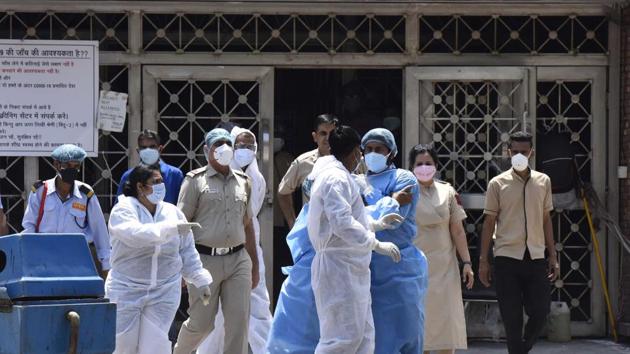Fewer Covid deaths in India: Health ministry
People above 60 years of age,who make up 10% of the country’s population, account for 50% of the 5,598 Covid-19 deaths recorded in India.
Fewer people are dying in India of Coronavirus disease (Covid-19) compared to the rest of the word, with India’s current case fatality rate at 2.82% compared to the global average of 6.13%, according to data released by the ministry of health and family welfare on Tuesday.

People above 60 years of age,who make up 10% of the country’s population, account for 50% of the 5,598 Covid-19 deaths recorded in India. Of these, 38% belong to the 60 and 74 years age group. Patients who were aged above 75 years old account for 12% of the deaths, the data shows. The data that the ministry released on April 30 showed 34.8% deaths were recorded in 45- 60 year age group.
“There is enough data being generated that people who are elderly (above 60 years of age), and those who suffer from some kind of underlying medical condition such as hypertension, diabetes or respiratory illness are at high risk and need to be extra careful as they are at a higher risk of developing severe form of disease,” said Lav Agarwal, joint secretary, health ministry, at a press briefing.
According to the health ministry’s analysis of the deaths, 73% of the Covid deaths are of patients with underlying medical conditions such as diabetes, hypertension, cardiovascular and respiratory disease.
“This section of population needs to keep their symptoms under control by taking regular medicines, consulting their doctor on time, taking preventive measures such as not stepping out of the house, if not necessary, and wearing a mask, following hand hygiene etc.,” Agarwal added.
In terms of deaths per 100,000 population, India has fatality rate 0.41 as opposed to 4.9 globally.
“India’s death rate is probably the lowest in the world, and that is enough to speak for how the country has managed its cases far better than some of the most developed countries in the world. Also, India’s case fatality rate has been steadily declining since past two months. In mid April it was around 3.3%, then it dropped to 3.25%, later to 3.15%, and as on today we stand at 2.82%, even then we can’t let our guard drop, and taking precautions must be turned into a habit,” Agarwal said.
“If you look at individual countries, some countries have even reported as high as 82 deaths per lakh population. This says how our focus on early case detection, and robust contact tracing in containment zones has been in the right direction, and it will continue to be our main strategy in future also, along with ramping up the Covid testing capacity,” Agarwal added.
Experts say focusing on the elderly and people suffering from non-communicable diseases (NCDs) is important as this section is more vulnerable to Covid-19.
“People with major NCDs need regular care, and are likely to develop severe form of illness because of their co-morbid conditions, which is why we are working on reference guidelines for patients, doctors and other support staff to look for ways to reduce morbidity and mortality among this group, ” says Dr Prashant Mathur, director, The National Centre for Disease Informatics and Research (NCDIR).
India’s daily Covid testing capacity at the moment is about 140,000 samples; and the Indian Council of Medical Research (ICMR) is aiming to scale it up to about 200,000 samples a day in the next two weeks.
“In past two months our focus has been to scale up testing, and we have managed to go from about a 100 labs in March to about 681 functional laboratories currently, of which 476 are government labs and 205 are private testing labs. Around the end of March we were doing about 20-25,000 samples in a day in India, and for the past few days the number on average is about 1.20 lakh samples a day,” said Dr Nivedita Gupta, scientist (epidemiology division), ICMR.
“There was shortage of supplies felt when we started out testing for Covid because there was a global demand for these supplies. Today, we have managed to handhold many indigenous manufacturers who are capable producing kits in bulk. We also use RT-PCR testing kits of at least 11-12 domestic manufacturers for testing, making us far more comfortable in terms of testing huge numbers in a short span of time than we were a few months ago,” she said.
RT-PCR is short for Reverse Transcription-Polymerase Chain Reaction, known as the gold standard among Covid-19 tests.
One of the private lab owners, on condition of anonymity, said, “It’s good to encourage indigenous manufacturers; however, we have to also ensure quality of products such as testing kits, swab sticks, viral transport medium that is being manufactured domestically. If the quality isn’t maintained then people will keep going for imported products.”
Get Current Updates on India News, Lok Sabha election 2024 live, Election 2024 along with Latest News and Top Headlines from India and around the world.




